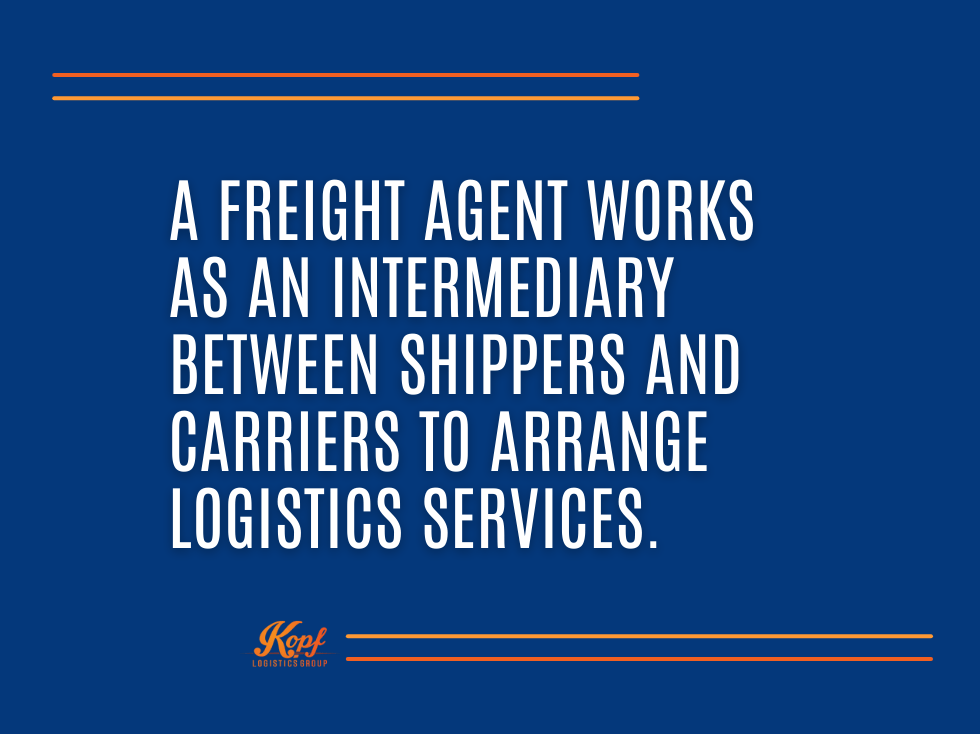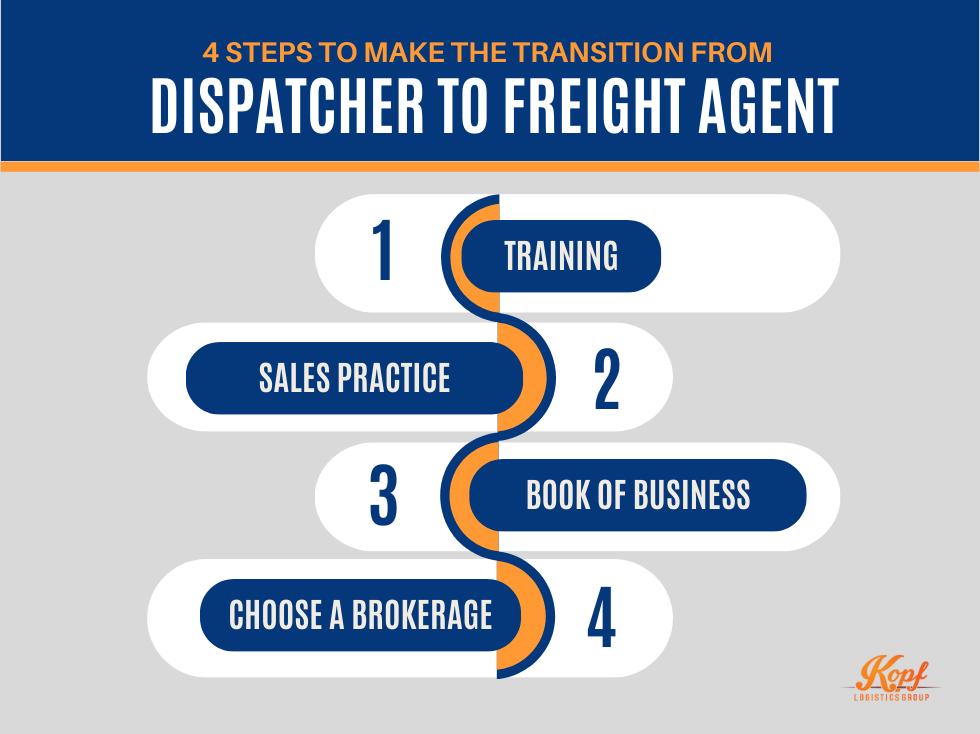Are you a truck dispatcher who wants to become a Freight Agent? If so, you’re in the right place. Our brokerage often receives inquiries from dispatchers wanting to make the switch. While they often assume it will be an easy transition, that is generally not the case. It is not easy, but it is possible.
In order to gain a more clear picture of how this can happen, let’s first take a look at the role of a dispatcher, the difference between a dispatcher and an Agent, why to become an Agent, transferable skills, and then four steps to take to successfully make the transition.
The Role of a Truck Dispatcher
First, what is a truck dispatcher?
A dispatcher is generally an employee of a carrier and ensures loads are picked up and delivered successfully in a timely manner. To do so, they communicate with their carrier’s fleet of truck drivers to arrange pickups and deliveries of a shipper’s freight. They often manage truck drivers’ schedules, optimize routes, and review driver logs. In addition, dispatchers are responsible for documenting shipment details and keeping accurate records.
While a dispatcher’s main role is involved with communicating with drivers to coordinate the moving of freight, they may also be responsible for sales. If so, they will research potential new shippers or loads and communicate with leads by making cold calls or writing cold emails.
Difference Between a Dispatcher and a Freight Agent
Now that we understand a dispatcher’s role, what does a Freight Agent do?
A Freight Agent works as an intermediary between shippers and carriers to arrange logistics services. While there are similarities between these two roles, there are also a few key differences.
- Employment status: A dispatcher is generally a W2 employee of a carrier (the company who ships the goods) while a Freight Agent is generally an independent contractor working on behalf of shippers (the company who owns the goods) under the authority of a freight brokerage.
- Focus: A dispatcher is primarily focused on the transportation process for their carrier. An Agent is focused on finding the best rates and services for their clients (shippers) while also continually finding new clients to diversify their book of business.
- Income: Dispatchers are either paid a base salary plus commission or commission only by the carrier for each load. A Freight Agent is paid commission for each load by the brokerage. Since they are contractors, they have unlimited earning potential.
Why Become a Freight Agent
Knowing these two roles are different, let’s consider why to become an Agent. There are numerous benefits of being a Freight Agent.
First, the main reason many dispatchers are interested in making the switch in roles is for financial opportunity. This is because Agents can earn high commissions for each load. At Kopf, for example, our Agents enjoy a 70/30 commission split and weekly payouts. The earning potential for talented Freight Agents is truly unlimited. You have your own book of business, manage your own time and ultimately control your own income.
Next, Freight Agents also have the ability to work remotely and set their own schedule. Many people are interested in working from home in order to maintain a healthier work-life balance. This is because Agents work flexibly and can choose to be available for important family routines such as dropping or picking their kids up at school or having lunch with their spouse. Agents generally work full days and/or nights, but they have control over their schedule.
Lastly, another benefit is that it is not expensive to start a freight agency. It requires a home office with a computer or laptop, internet, and a phone. Freight Agents do not need to have expensive insurance, licensing, or software because they work under the authority of a freight brokerage. The brokerage is generally responsible for these expenses.
Transferable Skills
Dispatchers already have several of the same skills as high performing Freight Agents. These skills will help them transfer to the role of Agent easier than those without any freight experience.
- Transportation logistics: Dispatchers understand how to move freight. As an Agent, these logistics skills make it much easier to move freight for your customers since you already use these skills daily. Understanding the process puts you a step ahead.
- Communication: Excellent communication skills are essential for dispatchers and Agents. Both need to communicate clearly and effectively and avoid making common communication mistakes.
- Problem solving: This soft skill is of high importance to both roles. Problems will arise with deliveries, that’s a given. However, skilled problem-solvers are able to see potential solutions and move forward effectively.
- Organization: There are many moving pieces involved with logistics. Dispatchers must have careful coordination of each element. This includes keeping accurate records and being detail-oriented. The same is true for Agents.
- Decision making: Dispatchers must make decisions quickly. This can be stressful. But for those who are confident decision makers, the transition to becoming an Agent will be easier.
The main skill dispatchers generally do not have is sales and networking experience. Usually, a sales team is responsible for this. However, if you are a dispatcher who is responsible for moving freight and also responsible for securing the customer, you may very well have the skills and experience needed to become a Freight Agent.
How to Make the Transition
There are four main steps a dispatcher should follow to become a Freight Agent.
Step 1: Get training.
It is important to understand what the role of a Freight Agent truly means and how to get started from someone who has experience in the industry. While we are not affiliated with Dennis Brown, we highly recommend his affordable course.
Step 2: Gain practice in sales.
This is absolutely critical. Freight Agents spend time every day generating leads, nurturing leads, and closing deals. Practice writing cold emails (try this email template) and make cold calls (try this cold call script). Keep in mind, sometimes it’s a numbers game. Rejection and daily consistency is part of the process. Begin a lifestyle of networking and consider new connections as opportunities.
Step 3: Start a book of business.
A book of business consists of the customers or clients you are currently doing business with. For an Agent, that would be shippers. When an Agent secures a shipper, they start building their book of business. Get started by targeting profitable industries.
Step 4: Work under a trusted freight brokerage.
It is legally necessary to work under the authority of a brokerage. Look for brokerages that offer 24/7 support, offer high commission splits, provide tools such as TMS software, and care about their Agents. If a brokerage is also a carrier, meaning they have their own trucks, this can also be advantageous.
Final Thoughts
The transportation industry is growing and there are plenty of opportunities. If you are a truck dispatcher who wants to increase your earning potential and set your own schedule from home, now is the perfect time to consider the switch. While the roles are similar, there are a few key differences, primarily related to sales. It is critical for anyone wanting to become an Agent to develop sales and networking skills.
To successfully make the transition, dispatchers should get training, practice sales, start a book of business, and work under a trusted brokerage. After you’ve gained experience, we look forward to hearing from you. In the meantime, we’ll be here cheering you on!



